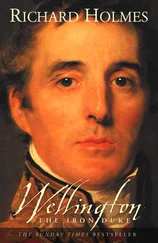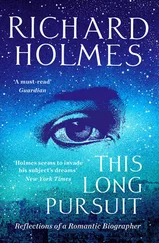1 ...6 7 8 10 11 12 ...19 The monks’ timetable had shifted little since Stevenson’s day. Prime began a little later, at three thirty in the morning; but the vegetarian fast was maintained from January till Eastertide. Prayer and hard physical work remained the staple of their lives. The cemetery stood behind a wall of the vegetable garden, a cluster of plain white crosses on a neat lawn, like a war grave in Passchendaele.
“And here at La Trappe,” said Father Ambrose as we stood again upon the terrace, “the summer visitors soon depart. We are alone again with Our Lady. Her snows fall from November until April. Sometimes we are cut off for days. Cut off from everything … except from God. And sometimes it is so… But you must pray for us. Pray for us on your road. You will do that, my friend, I think? And come back again, we will be here. Your rucksack is a light one.”
Father Ambrose smiled and turned rapidly away, slipping his hands into the long white sleeves of his habit and stepping off into silence. The sound of his sandals retreated along the stone-flagged terrace. I was left strangely confounded, perplexed; this was not what I had expected. In a sense I felt they had found me out.
Stevenson’s reactions to the Trappists were greatly complicated by the presence of two other visitors in the guest wing, a local Catholic priest and a retired soldier. The priest had walked over from his country parish at Mende for four days’ solitude and prayer; the ancien militaire de guerre , a short, grizzled and somewhat peppery personage in his fifties, had come to La Trappe as a visitor—like Stevenson—and remained to study as a novice. Neither had the simplicity or the wisdom of the monks; they were “bitter and narrow and upright” in their beliefs, “like the worst of Scotsmen”, reflected Stevenson. But it was only in the morning that they discovered that a Protestant heretic was in their midst: “My kindly and admiring expressions as to the monastic life around us, and a certain Jesuitical slipperiness of speech,” observed Stevenson slily, “which I had permitted myself in my strange quarters, had probably deceived them, and it was only by a point-blank question that the truth came out.” There was an immediate explosion. “Et vous prétendez mourir dans cette espèce de croyance?” burst out the priest.
Clergyman and army officer now attempted to convert Stevenson with righteous fervour. They took it for granted that he was secretly ashamed of his faith as a Protestant; disdained all theological discussion, brushed aside Stevenson’s appeal to family loyalties, and crudely urged the horrors of hell-fire. He must go to the Prior of La Trappe and declare his intention to convert; there was not a moment to lose; he must instantly become a Catholic. The atmosphere became quite embarrassing. “For me who was in a frame of mind bordering on the effusively fraternal, the situation thus created was painful and a little humiliating.” He escaped on a long walk round the monastery grounds, but on returning for lunch was again attacked by the proselytising pair. This time they began to mock him for his stubbornness and ignorance, and unwisely referred to his beliefs as those of a “sect”—for they thought “it would be doing it too much honour to call it a religion”. His attempts at explanation were received with “a kind of ecclesiastical titter”. Finally Stevenson’s temper—which could be formidable: he had once broken a bottle of wine against a wall in a Paris cafe during an argument with the management—began to get the better of him. Trembling with emotion and going rather white, he leant across the table to the parish priest: “I shall continue to answer your questions with all politeness; but I must ask you not to laugh. Your laughter seems to me misplaced; and you forget that I am describing the faith of my mother.” An awkward silence fell, and the priest, remarked Stevenson, “was sadly discountenanced”.
However, dignity was restored, the ancien militaire de guerre —no doubt recognising another kind of fighter—made soothing noises, and the cure hastily assured him that he had no other feeling but interest in Stevenson’s soul. The incident was closed, and they parted on friendly terms. But Stevenson was probably taught something after all: for here he was hotly defending a religion, the Presbyterianism of his childhood, in which he had supposed he had no formal belief whatsoever. It led him to reflect, towards the end of his journey, on the mysterious nature of belief itself, on its profound roots in the heart and the sense of identity; and the degree to which formal creeds were inadequate to contain and express one’s deepest moral convictions.
In the Travels he added a friendly, if somewhat patronising, envoi to the priest as a fellow-traveller on the rough road of life:
Honest man! he was no dangerous deceiver; but a country parson, full of zeal and faith. Long may he tread Gévaudan with his kilted skirts—a man strong to walk and strong to comfort his parishioners in death! I daresay he would beat bravely through a snowstorm where his duty called him; and it is not always the most faithful believer who makes the cunningest apostle.
The experience of the monastic life, even—and perhaps especially—in a passing glimpse, was both vivid and unsettling for Stevenson. In some ways it was weird, even repellant: Father Apollinaris’s “ghastly eccentricity” as he suddenly raised his arms and flapped his fingers above his tonsured head, to indicate that the vow of silence had come back into force at the monastery gate, became a comic symbol of this. Yet in other ways it was obviously attractive to Stevenson. And what it attracted, I think, was paradoxically not the religious man, but the artist in him. He was drawn and fascinated by the idea of the celibate life within a community. The ascetic standards—the silence, the physical discipline, the solitary spiritual endeavour—appealed to him as a writer. The clarity of purpose, the absence of distraction, the lifelong sense of self-commitment were exactly the kind of ideals he felt he should be nourishing in himself as a professional author. The monks represented a sort of Flaubertian perfection. In their own way they had given up the world for an art form. Should he not do the same?
To begin with I had conceived of Stevenson’s journey—and experienced it for myself—as a physical trial, a piece of deliberate “adventuring”, a bet undertaken against himself, that he could survive on his own. His ill-health, his struggle against consumption, together with the real wildness of the Cévennes a hundred years ago made this trial a genuine enough affair.
But here was a new element, a metaphysical one. Stevenson was making a pilgrimage into the recesses of his own heart. He was asking himself what sort of man he should be, what life-pattern he should follow. Many hints had already suggested strongly to me that he was in love with someone. The incident with the young married couple in the inn at Le Bouchet was one obvious pointer; and the whole slightly mannered drama with Modestine seemed to me to contain some element of a private joke, a comic (but none the less serious) little allegory about his relations with the opposite sex.
The question he seemed to be formulating at La Trappe came down to this. As a writer, as an artist, should he be living and working on his own, celibate (or at least unmarried) and dedicated purely to the ideals of a literary community? Or should he commit himself emotionally to something, and someone else: to domesticated love, to marriage, to a professional life undertaken in partnership? For a young and ambitious Victorian writer this was no light or hypothetical question. He could survive comfortably as a single man on an allowance from relatively wealthy and well-meaning parents; and artistically he could flourish in the London literary world of clubs, pubs, reviews and masculine “bohemia”. It required the most fundamental decisions about his future. Most of all, from a man of Stevenson’s unusual temperament, to whom the enclosed Scottish world of his boyhood was so imaginatively important, it meant a choice about how far he could afford to grow up, to come fully into man’s estate.
Читать дальше












